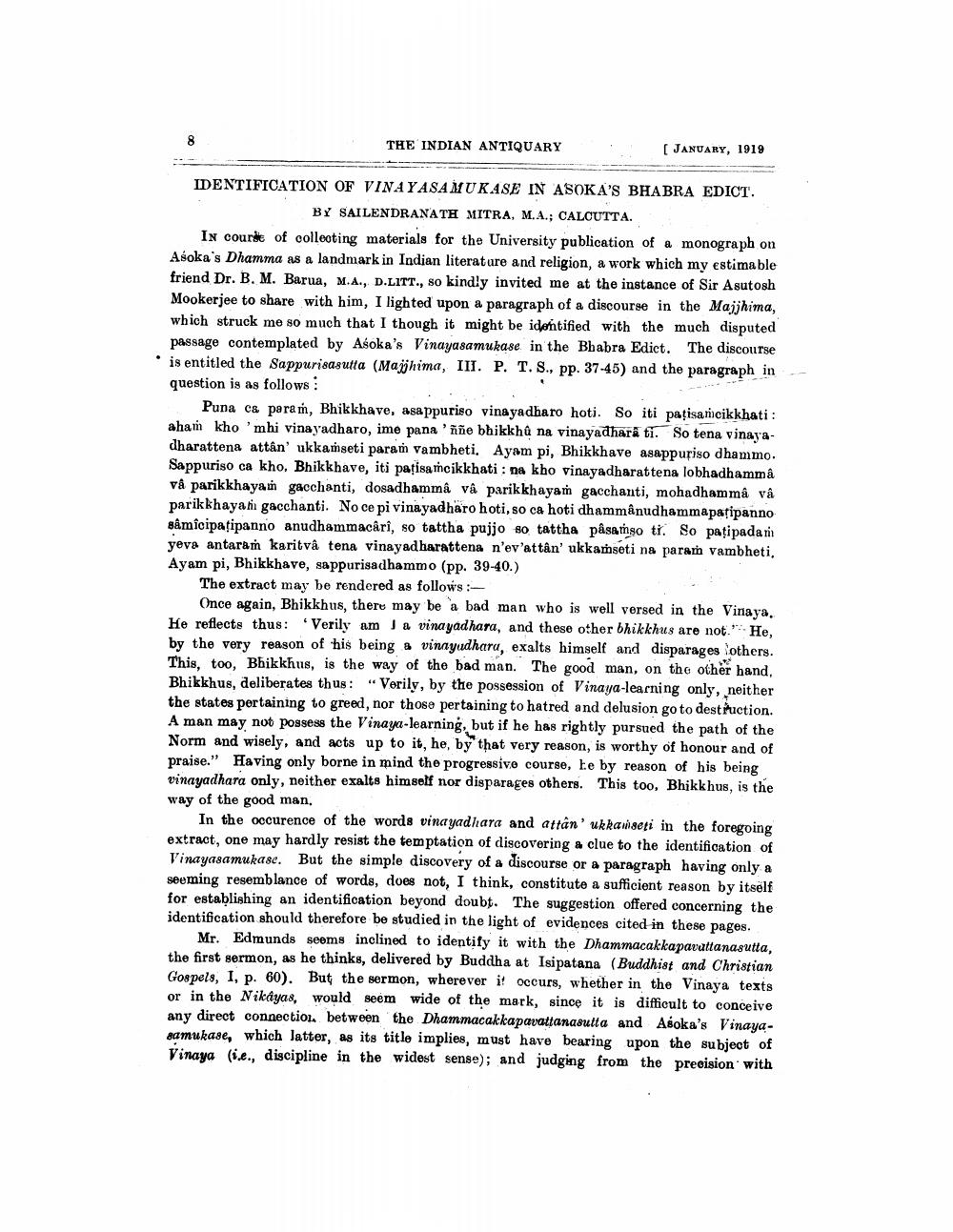________________
THE INDIAN ANTIQUARY
:
[ JANUARY, 1919
IDENTIFICATION OF VINAYASAMU KASE IN ASOKA'S BHABRA EDICT.
BY SAILENDRANATH MITRA, M.A.; CALCUTTA. IN court of collecting materials for the University publication of a monograph on Asoka's Dhamma as a landmark in Indian literature and religion, a work which my estimable friend Dr. B. M. Barua, M.A., D.LITT., so kindly invited me at the instance of Sir Asutosh Mookerjee to share with him, I lighted upon a paragraph of a discourse in the Majjhima, which struck me so much that I though it might be identified with the much disputed passage contemplated by Aśoka's Vinayasamukase in the Bhabra Edict. The discourse is entitled the Sappurisasutta (Majjhima, III. P. T. S., pp. 37-45) and the paragraph inquestion is as follows:
Puna c& paran, Bhikkhave, asappuriso vinayadharo hoti. So iti pațisamcikkhati: aham kho 'mhi vinayadharo, ime pana 'ñiñe bhikkhů na vinayadhara ti. So tena vinayadharattena attân' ukkamseti param Vambheti. Ayam pi, Bhikkhave asappuriso dhammo. Sappuriso ca kho, Bhikkhave, iti pațisamcikkhati: na kho vinayadharattena lobhadhammâ vå parikkhayam gacchanti, dosadhamma vâ parikkhayam gacchanti, mohadhamma vå parikkhayan gacchanti. No ce pi vinayadharo hoti, so ca hoti dhammânudhammapatipanno sâmîcipatipanno anudhammacârî, so tattha pujjo so tattha pâsamgo ti. So patipadam yeva antara karitvå tena vinayadharattena n'ev'attân' ukkamsoti na paran Vambheti, Ayam pi, Bhikkhave, sappurisadhammo (pp. 39-40.)
The extract may be rendered as follows:
Once again, Bhikkhus, there may be a bad man who is well versed in the Vinaya. He reflects thus: Verily am Ja vinayadhara, and these other bhikkhus are not. He, by the very reason of his being & vinayudharu, exalts himself and disparages others. This too. Bhikkhus, is the way of the bad man. The good man, on the other hand, Bhikkhus, deliberates thus: "Verily, by the possession of Vinaya-learning only, neither the states pertaining to greed, nor those pertaining to hatred and delusion go to destruction. A man may not possess the Vinaya-learning, but if he has rightly pursued the path of the Norm and wisely, and acts up to it, he, by that very reason, is worthy of honour and of praise." Having only borne in mind the progressive course, ke by reason of his being vinayadhara only, neither exalts himself nor disparages others. This too, Bhikkhus, is the way of the good man.
In the occurence of the words vinayadhara and attân'ukkaniseri in the foregoing extract, one may hardly resist the temptation of discovering a clue to the identification of Vinayasamukase. But the simple discovery of a discourse or a paragraph having only a seeming resemblance of words, does not, I think, constitute a sufficient reason by itself for establishing an identification beyond doubt. The suggestion offered concerning the identification should therefore be studied in the light of evidences cited in these pages.
Mr. Edmunds seems inclined to identify it with the Dhammacakkapavuttanasutta, the first sermon, as he thinks, delivered by Buddha at Isipatana (Buddhist and Christian Gospels, I, p. 60). But the sermon, wherever it occurs, whether in the Vinaya texts or in the Nikayas, would seem wide of the mark, since it is difficult to conceive any direct connection between the Dhammacakkapavattanasutta and Asoka's Vinayasamukase, which latter, as its title implies, must have bearing upon the subject of Vinaya (.e., discipline in the widest sense); and judging from the precision with




